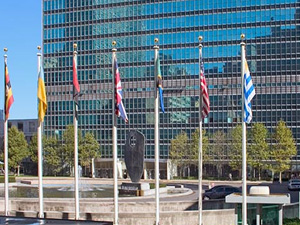



Date:01/11/11
 A United Nations commission outlined four new targets to boost broadband Internet uptake and usage worldwide, one of which called for additional regulation to make broadband services more affordable in emerging markets.
A United Nations commission outlined four new targets to boost broadband Internet uptake and usage worldwide, one of which called for additional regulation to make broadband services more affordable in emerging markets.
"By 2015 entry-level broadband services should be made affordable in developing countries through adequate regulation and market forces," the UN's Broadband Commission for Digital Development said. Its suggested benchmark is that entry-level broadband services should cost less than 5% of average monthly income in developing markets.
In a separate target, the commission said 40% of households in developing countries should have Internet access by 2015. Its other two goals are more global.
"By 2015 all countries should have a national broadband plan or strategy, or include broadband in their universal access / service definitions," the commission said.
It also called for Internet user penetration to reach 60% worldwide by 2015, 50% in developing countries and 15% in what it described as least developed countries.
"These targets are ambitious but achievable, given the political will and commitment on the part of governments, working in partnership with the private sector," said ITU secretary-general Hamadoun Toure in a statement.
The ITU has undertaken to measure each country's progress towards the targets and will produce an annual broadband report ranking countries by broadband policy, affordability and uptake.
In addition, the commission urged governments not to hamper market entry or to tax ICT services unnecessarily. It also highlighted the importance of international standards for interoperability and the availability of adequate radio spectrum.
"It is essential to review legislative and regulatory frameworks, many of which are inherited from the last century, to ensure the free and unhindered flow of information in the new virtual, hyper-connected world," the commission said
UN calls for more regulation to make broadband affordable
 A United Nations commission outlined four new targets to boost broadband Internet uptake and usage worldwide, one of which called for additional regulation to make broadband services more affordable in emerging markets.
A United Nations commission outlined four new targets to boost broadband Internet uptake and usage worldwide, one of which called for additional regulation to make broadband services more affordable in emerging markets."By 2015 entry-level broadband services should be made affordable in developing countries through adequate regulation and market forces," the UN's Broadband Commission for Digital Development said. Its suggested benchmark is that entry-level broadband services should cost less than 5% of average monthly income in developing markets.
In a separate target, the commission said 40% of households in developing countries should have Internet access by 2015. Its other two goals are more global.
"By 2015 all countries should have a national broadband plan or strategy, or include broadband in their universal access / service definitions," the commission said.
It also called for Internet user penetration to reach 60% worldwide by 2015, 50% in developing countries and 15% in what it described as least developed countries.
"These targets are ambitious but achievable, given the political will and commitment on the part of governments, working in partnership with the private sector," said ITU secretary-general Hamadoun Toure in a statement.
The ITU has undertaken to measure each country's progress towards the targets and will produce an annual broadband report ranking countries by broadband policy, affordability and uptake.
In addition, the commission urged governments not to hamper market entry or to tax ICT services unnecessarily. It also highlighted the importance of international standards for interoperability and the availability of adequate radio spectrum.
"It is essential to review legislative and regulatory frameworks, many of which are inherited from the last century, to ensure the free and unhindered flow of information in the new virtual, hyper-connected world," the commission said
Views: 1167
©ictnews.az. All rights reserved.Similar news
- 24% of U.S. Adults have made phone calls on the Internet
- UNESCO puts sustainable learning online
- Australia gives incentives for the use of telehealth
- US launches computer programme for poor kids
- UN declares web access as human right
- Facebook growth slows in stalkerbase heartlands
- One Third of Millionaires Use Social Media
- Facebook Seeks Bigger Role in Software for Mobile Apps
- Icann increases web domain suffixes
- IBM launches new social networking platform for enterprises
- Google Notches One Billion Unique Visitors Per Month
- Internet providers cut international channel renting costs by 60%
- Azerbaijan launches standard time on internet
- Icann launches facility to ease DNSSec adoption
- Social network data mining yields worrying results for traditional media





















